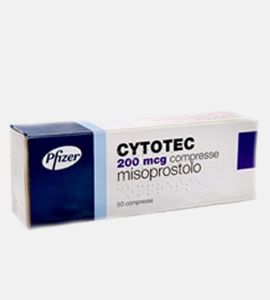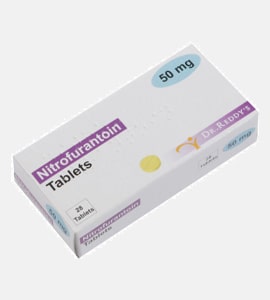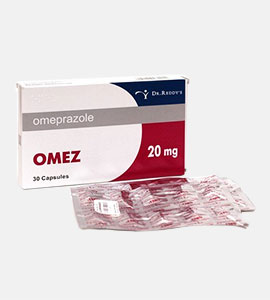Description
Cytotec is a highly impactful synthetic medicinal product that is mainly used as an effective anti-ulcer medication. This chemical analog of prostaglandin has a cytoprotective effect associated with increased mucus formation in the stomach and increased secretion of bicarbonate by the gastric mucosa. Thanks to its direct influence on the parietal cells of the stomach, it suppresses the basic and night secretion. When taken correctly it may also reduce the secretion stimulated by meals.
The medicinal agent is also used to protect the stomach from the hazards associated with non-steroidal anti-inflammatory medications.
How to take
The medication comes in the form of pills that contain 200 µg of the active substance. It must be taken by mouth and in accordance with the obtained prescription provided by a professional health care specialist. The usual single dose is 200-400 µg, but the people suffering from hypersensitivity to its components or renal insufficiency must not take more than 100 µg.
Both the exact frequency of admission and the duration of the planned treatment depend on the patient’s conditions and the effectiveness of the therapy.
The overdose of the therapeutic agent may lead to highly dangerous consequences for your health. Avoid accidental misuse and seek professional help upon detection of any negative effects or uncomfortable health conditions that appear during the therapy.
Safety information
Being a powerful medication with extremely significant clinical effects, the medication requires special care and must not be used under any other circumstances except to the extent permitted by the instructions and your physician.
It must not be used by people with severe liver diseases, inflammatory bowel disease, severe renal failure, and enteritis.
The drug may provoke miscarriage when used as a gastroprotective agent during pregnancy. The therapy with the medication during pregnancy or breastfeeding is strictly prohibited for safety reasons.
The effective birth-control methods must be applied throughout the therapy and during the first month after its end to ensure that the drug may not cause any harm to the fetus.
The therapy must be immediately stopped upon the detection of pregnancy.
The medicine is also not intended for children and adolescents under 18 years.
The drug may have various forms of interaction with vitamins, other pharmaceutical agents, and herbal medicines. To minimize the hazardous effects make sure your physician is informed about all the medicines you are taking or planning to take during the treatment regimen.
Side effects:
• abdominal pain;
• flatulence;
• diarrhea;
• constipation;
• nausea.
• skin rash;
• itching;
• angioedema.
• abdominal pain;
• dysmenorrhea;
• menorrhagia.
• changes in body weight;
• asthenia;
• increased fatigue;
• seizures (in extremely rare instances, mostly in women in the pre- or post-menopausal period).



